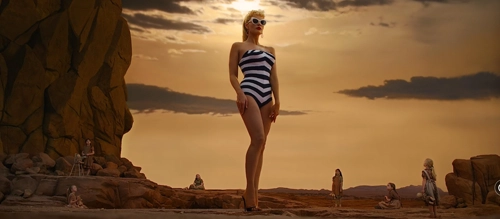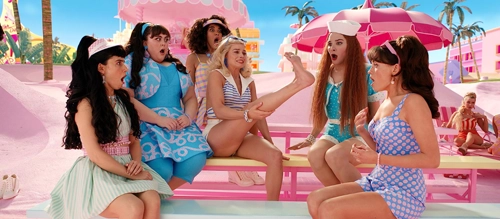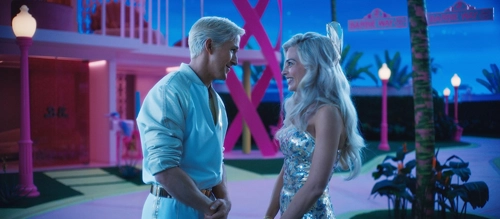
Barbie (2023)
Director Greta Gerwig
Screenwriters: Greta Gerwig, Noah Baumbach
Starring: Margot Robbie, Ryan Gosling, America Ferrera, Ariana Greenblatt, Kate McKinnon, Issa Rae, Hari Nef, Kingsley Ben-Adir, Simu Liu, Rhea Pearlman, Will Ferrell
Barbie (2023), directed by Greta Gerwig and co-written by Gerwig and partner Noah Baumbach, shattered records this weekend, earning the highest-grossing opening of 2023 so far as well as the biggest debut for a female director in history. This film is the biggest thing Greta Gerwig has ever done, a project on a scale she has never attempted before. The result is a stunning, cotton candy-colored rollercoaster ride. It’s messy and it’s weird and, against all odds, it manages to stick the landing. Through it all, Gerwig’s heart never stops beating and her artistic voice remains. It may be a big studio production, but Greta Gerwig is no puppet; this is her movie from start to finish.
Despite her monumental box office achievement, some online discourse has turned against Barbie’s director in recent weeks. Commentators began questioning why she, an indie darling, the face of the mumblecore movement, would trade her small-scale dramas for a big-budget film based on an IP. Articles online featured headlines that read, “Has Barbie Killed the Indie Director?” Ann Manov, writing for The New Statesman, asked, “The director has achieved her ambition of becoming a blockbuster director – but at what cost?” While some applauded her for finding the kind of success that usually eludes female filmmakers, others complained that Gerwig had turned into a corporate shill, a mouthpiece for consumerism, the only person that has ever made a movie about a toy.
It’s really fitting that Gerwig, genius that she is, made a film addressing all of these concerns before they were ever even raised.
After an origin story that is a delightful homage to Stanley Kubrick’s 2001: A Space Odyssey, Barbie begins with a commercial featuring little girls playing with their Barbies. “Isn’t she cool”, Mattel asks us. They go through the history of Barbie, and how she evolved from blond-haired, blue-eyed, stereotypical Barbie to become more diverse and inclusive. Barbie can do anything, Mattel says, just like you! They sell female empowerment – promising little girls the world. In a very purposely unaware moment, Margot Robbie’s Barbie declares that Barbie fixed everything, actually – sexism has been defeated, and the world is now perfect.
In Barbieland, that’s true. Barbieland exists as a parallel universe to the real world with everything reversed. In Barbieland, women rule. They’re doctors and lawyers and Nobel prize winners. Issa Rae plays President Barbie, who gets the satisfying privilege of dropping the only f-bomb in the movie. Women are revered; their intelligence is never questioned. They get to be fabulous, wear sparkles, and run the world. It may be perfect, but is it real?
Barbieworld is, of course, emphasized by the set design, the quality of which cannot be overstated. It’s an incredible feat. Sarah Greenwood and Katie Spencer, known for their work on Joe Wright’s Atonement and Pride and Prejudice, served as production designer and set designer respectively. There is something so satisfying about how tactile the sets are – how you can look at the smooth, chunky plastic doll houses and know exactly how they would feel. It’s artificial yet relatable, faux-lifelike. The set is a mix of life-size practical designs and miniatures, and if there was ever an argument for what practical special effects can accomplish, it’s Barbie. Everything feels theatrical in Barbieland, almost slapstick, and this soundstage look purposefully and beautifully harkens back to the vibrancy of Technicolor musicals from the 1940s and 1950s.
The Kens are there, of course, but they’re more of an afterthought. They exist to worship their respective Barbies. In a clever subversion of the creation myth, Ken exists only as an extension of Barbie. It’s a world not free of men necessarily, but free of the social constructs and institutions that contribute to the kind of behavior that gets women catcalled on the street or touched inappropriately at a bar. It’s safe and innocent, like childhood.
But everyone has to grow up sometime.

The real trouble starts when stereotypical Barbie, played with endless charm and warmth by Margot Robbie, who also serves as a producer on the film, begins to feel things. She starts to contemplate her own existence, having obsessive thoughts of death. As explained by the weird Barbie (Kate McKinnon) – so named because she was played with too hard, and sports a jagged haircut and felt marker all over her face – the little girl playing with Barbie is having a crisis, and it’s bleeding over into Barbieland. Weird Barbie, in another hilarious riff – this time on the red pill/blue pill scene from The Matrix – explains that Barbie must travel to the real world to set things right with the little girl playing with her so that everything can go back to normal. Barbie must choose: take the high heel or the sandal.
Barbie enters the real world of Venice Beach, California with her Ken (Ryan Gosling) in tow, and they both realize the awful truth: the real world sucks. In the first five minutes of being there, Barbie gets sexually assaulted, arrested, and bursts into tears. She comes to find that Barbie didn’t fix anything. In fact, she might have made things worse. She’s just an idea sold to girls to make them think they can do anything – but reality is far more complicated than that. Ken, of course, discovers toxic masculinity and, after forever of feeling like he isn’t good enough, returns home to attempt a mutiny in Barbieland.

There’s no doubt that Barbie was made by an elder millennial, for elder millennials. It’s not that Barbie isn’t a good time for everyone, because it certainly is – and despite a few adult jokes that will probably go right over their heads, it’s pretty accessible for kids – but the movie will most likely hit the hardest with women who experienced all of the deeply traumatic, unique ways women were tortured in the media in the 90s and early 2000s. It’s clear that Gerwig is coming from a place of trying to make sense of the world she grew up in, trying to figure out how to move forward. It’s simplistic in its views of sex and gender, but that doesn’t seem like a flaw. It kind of seems like the point.
Barbie is, after all, a blank slate. She has lived her whole existence in a utopia where every day is the best day. In a lot of ways, she’s just a child, experiencing the full range of human emotion for the first time. Barbie and Ken are Adam and Eve, thrown out of the Garden of Eden to experience what it means to truly be human, to be aware.
While the film’s biblical undertones are apparent, Barbie’s journey is also a coming-of-age story. Margot Robbie is, to no-one’s surprise, incredible. This is a role she was very much born to play and she relishes every moment of it. Robbie’s strengths lie in how personable she is, how it’s practically impossible to hate her. She is so effortlessly vulnerable, and it is in her moments of conflict and tragedy that that the film really shines. Ryan Gosling’s Ken is also worthy of praise – he’s not afraid to make fun of himself, to be silly or even pathetic. Gosling’s comedic talent really gets to shine in Barbie, and his singing and dancing skills are put to far better use than they were in La La Land. As for the other Barbies and Kens, Hari Nef as Doctor Barbie is a standout, as is Issa Rae and Michael Cera as Ken’s friend, Allan, a toy that has long been discontinued.
The film is both a celebration of the things we loved in our childhoods and a critique of the endless lies corporations try to sell us. It’s a miracle that Gerwig got away with some of the more obvious criticisms of Barbie IP owners Mattel, and while Barbie is by no means a scathing indictment of consumerism, it is clear Gerwig was given more creative freedom than people may have expected.
America Ferrera’s Gloria, along with her teenage daughter Sasha, played by Ariana Greenblatt, are probably the only glaring missteps in movie. Their characters are integral to the story, but they feel underdeveloped and aren’t given nearly enough time to breath. And while Gloria does get a hearty monologue about how impossible it is to be a woman, it does feel slightly forced. Perhaps this was to maintain focus on Barbie herself, whose encounters with an elderly woman at the bus stop, played by costuming legend Ann Roth, and a late scene with Ruth Handler (Rhea Perlman), creator of Barbie, are the heart and soul of the film.
Like any good spectacle, there is a universal, human truth at the core of Barbie, and co-writer director Greta Gerwig never loses sight of that. She keeps her soul, the very thing that made audiences fall in love with her work in the first place, and Barbie therefore delivers almost precisely what we had all hoped.
Score: 21/24

